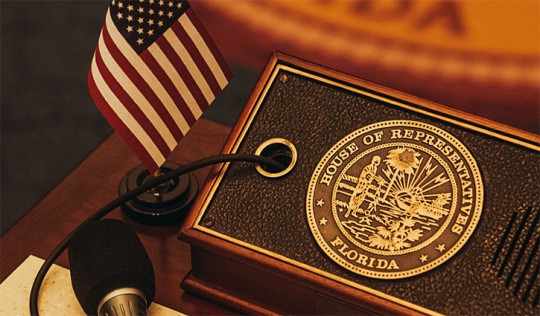Stage Set For Reaching Deal On Florida Tax Cuts
March 5, 2018
Florida lawmakers prepared Friday to hammer out a tax-cut plan, with the Senate introducing a $148 million package and the House scrapping a controversial tax-related proposal that local governments argued could prevent them from banning unwanted businesses such as “puppy mills.”
For most Floridians, the highlights of a final package could be sales-tax “holidays” for back-to-school shoppers and hurricane-season preparations, though the details of House and Senate proposals differ and will have to be negotiated.
House and Senate leaders said earlier this week that they expect a final tax-cut package of about $80 million. Both proposals are larger than that benchmark, but legislative leaders have said they will need to scale back tax cuts to help pay for a $400 million school-safety plan after the mass shooting last month at Marjory Stoneman Douglas High School in Parkland.
House Ways & Means Chairman Paul Renner, a Palm Coast Republican whose committee crafted a nearly $400 tax-cut package, acknowledged Friday that changes will be needed.
“Given the recent events, there will be some changes before we get to the final tax bill,” Renner said.
The House on Friday took up its package (HB 7087) and positioned it for a vote as soon as Monday.
The House package includes a 10-day tax holiday for back-to-school shoppers, which would allow people to avoid paying sales taxes on clothes costing $60 or less and school supplies costing $15 or less and on the first $1,000 of the cost of personal computers and accessories. The House plan also includes three seven-day holidays on the purchases of hurricane supplies.
Also, the House package includes a controversial plan to expand by $154 million a year sales-tax credits that businesses could receive to fund voucher-like scholarships in the Gardiner Scholarship Program and the Florida Tax Credit Scholarship Program.
The Senate package (SB 620) approved Friday by the Appropriations Committee does not include the tax-credit proposal.
Renner called the school tax credits a “very, very important” part of the House plan. But Renner moved Friday to remove two controversial proposals that had only been in the House package.
The first was language that would have prohibited local governments from banning sales of goods that are subject to sales taxes. Local government officials argued the policy change could have lifted restrictions now in place against “puppy mills” and adult entertainment establishments.
The second issue removed Friday would have further lowered a tax on aviation fuel, a proposal that had been opposed by airport officials across Florida.
Proponents of the aviation fuel tax reduction — the rate is already set to drop from 6.9 cents to 4.27 cents a gallon next year — argued a further decrease would help draw more air traffic. Airport officials countered that the reduction wouldn’t result in more flights to Florida, and their facilities rely on the fuel tax to obtain matching federal dollars to pay for upgrades.
Renner said “our priorities have changed” after the Parkland school shooting and that the move wasn’t tied to a Delta Air Lines decision to drops a discount program for National Rifle Association members — an issue that has drawn heavy attention in Georgia’s legislature.
“This is a first step in looking at how we make additional revenues available,” Renner said of removing the proposed $14.1 million aviation fuel-tax reduction from the bill. “We’re going to spend upwards of $400 million in school hardening, in school security and mental health, and these other areas, and that money has to come from somewhere.”
Senate Finance and Tax Appropriations Chairwoman Kelli Stargel, R-Lakeland, said the Senate measure, which includes components of other bills, should address the needs of many Floridians, especially “people who suffered from Hurricane Irma.”
The Senate is offering a reduction in a commercial lease tax from 5.8 percent to 5.7 percent. The House has proposed dropping the tax rate to 5.5 percent starting Jan. 1.
The Senate package includes a seven-day tax holiday on hurricane-preparation items such as batteries, portable self-powered radios and generators.
The Senate’s back-to-school holiday would run three-days in early August. Unlike the House’s 10-day proposal, the Senate would not lift sales taxes on the first $1,000 of the price of a personal laptop computers and accessories.
Both the House and Senate would provide tax breaks on fencing materials purchased for repairs after Hurricane Irma. Also, proposals call for providing tax breaks for citrus packing houses that have had their businesses interrupted by Hurricane Irma or the disease citrus greening and for fuel used to transport agricultural products after the storm.
by Jim Turner, The News Service of Florida
Comments
One Response to “Stage Set For Reaching Deal On Florida Tax Cuts”




Gov. Scott and the State Legislature are determined to CUT TAXES which is very popular. And, really, who likes paying them?
The thing is that TAXES PAY for the things we as a community need such as roads, law enforcement, School Safety, the list is endless.
Without State Taxes the burden of paying for Services to the Community falls upon those of us who live in the counties.
Property taxes are regulated by the state, HOWEVER, the Value of property can be raised. Your home, land, is Worth More thus we will Pay More to the County whether or not we’ve really improved our homes or property. The only way for the county to maintain a way to pay for Citizen Services.
UNFUNDED Mandates, the Legislature says “Protect Schools” and lays out some guidelines which must be followed. HOWEVER, the Legislature is famous for Not Providing Funding ( which comes from taxes ) and the local county schools have to find funding or face penalties.
Cutting taxes is a good thing for us taxpayers to hear but the impact down the road is that old saying of “Doing More With Less” and that at some point becomes impossible.